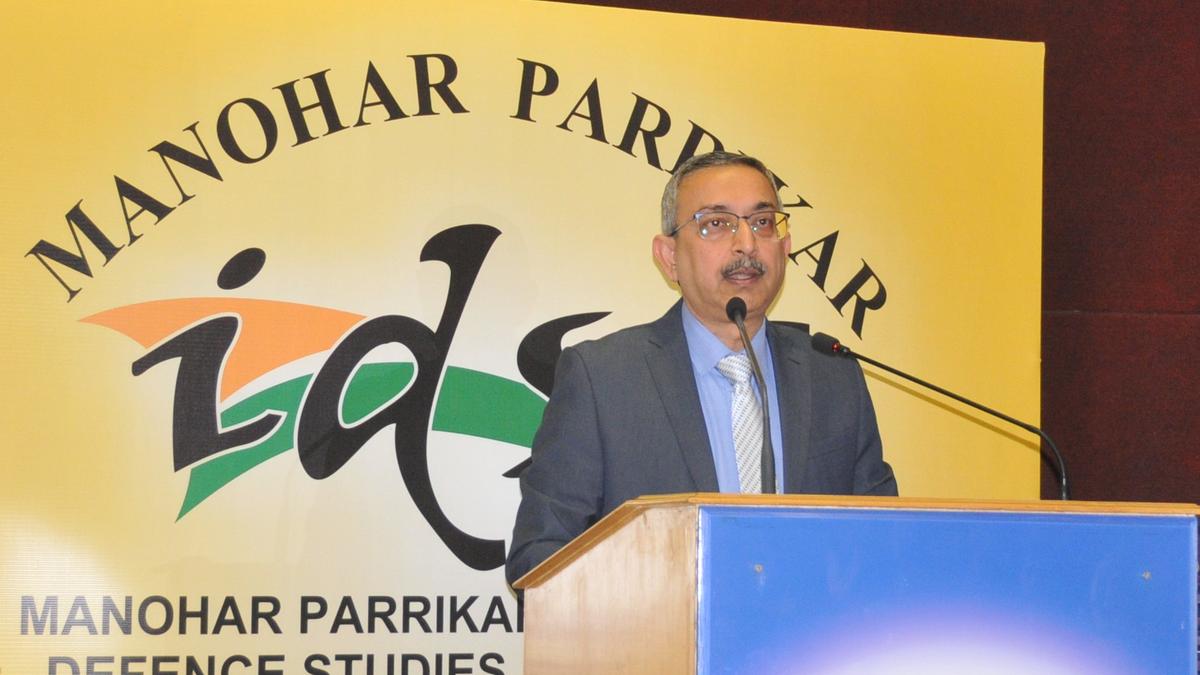A pilot study on Lethal Autonomous Weapons Systems (LAWS) commissioned by the Defence Ministry highlights the transformative potential of these technologies while raising important questions about control, accountability, and ethical deployment, according to a senior Ministry official. These autonomous weapons, which can be fired without human intervention, are powered by artificial intelligence or AI.
A key challenge identified in the study is “the gap between our aspirations and the current capabilities of our defence base.” The study was conducted in collaboration with the Manohar Parrikar Institute of Defence Studies and Analyses (MPIDSA).
Opinion | India’s journey so far on the AI military bandwagon
India is alert to the opportunities and challenges from this fast-evolving technology scenario and its ubiquitous nature, said Tanmaya Lal, Secretary West in the Ministry of External Affairs (MEA). He noted that the region has a history of armed conflict and cross-border terrorism, with two nuclear-armed neighbours. One of them is China, which is a permanent member (P-5) of the UN Security Council and a front-runner in AI development. “Because of serious security threats, India is pushing for defence,” he said.
Integrating AI into defence
“For India’s defence establishment, developing AI capabilities is critical for three key reasons: to maintain strategic autonomy in an era where technological superiority dictates military advantage; to play a meaningful role in shaping the international regulatory framework; and finally to prepare our forces for future conflicts involving such systems,” said Samir Kumar Sinha, an Additional Secretary in the Defence Ministry and the Director-General for Acquisition. The study is meant to address these priorities, he said, addressing a seminar at MPIDSA on ‘India’s approaches to AI in military domain and emerging tech in LAWS’, which was jointly organised by the Defence Ministry and the MEA from January 28 to 30.
Indian defence manufacturers, both public and private, are in the early states of incorporating AI into military platforms, Mr. Sinha observed, pointing to the complexity of autonomous systems and international export controls on AI components, which present significant challenges. Developing sovereign capabilities in critical technologies is a pressing need, he stressed. “AI integration in the military domain must adhere to clear norms and principles to minimise risks and maximise opportunities,” he added.
Also Read | President Droupadi Murmu highlights India’s push for AI and emerging tech in defence
Global AI weapons race
More than 50 countries — including the P-5, as well as Germany, Japan, Singapore, South Korea, and Ukraine — have come up with their own AI strategies for defence. All major powers are racing to integrate AI in the military domain and striving to build a critical competitive edge, even as Big Tech players are ramping up investment in AI innovation, including for military use. This is happening against the backdrop of a “fundamental geopolitical flux and scramble for power in a largely ungoverned world,” Mr. Lal said. “A scramble for chips, critical minerals, energy, talent and data – all essential for AI. There is a gridlock at the UN,” he added.
India established an AI task force in 2018, followed the next year by the Defence AI Council and Defence AI Project Agency. So far, 75 priority areas have been identified for AI in defence, while the State-run defence industry has developed AI roadmaps, Mr. Lal said. “The armed services have established a joint working group on AI and are also engaging with iDEX (Innovations for Defence Excellence initiative),” he added.
Responsible AI use
At the UN General Assembly, India has maintained that LAWS should be discussed by a Group of Governmental Experts, which proceeds on the basis of consensus. While India voted against a 2023 UNGA resolution on the subject, it abstained in 2024.
Mr. Lal said India has participated in summits on responsible AI in the military domain (REAIM), but has not endorsed their outcome documents nor the political declaration proposed by the U.S., as it believes that the UN processes should take primacy. At the UN, India contributed to the deliberations on finalising a Global Digital Compact last September. “India has advocated greater technology deployment in peacekeeping operations. More broadly, India has argued for and contributed to technology capacity building with partners,” Mr. Lal added.
Opinion | Marching ahead with technology absorption
Mr. Sinha explained that India has adopted a framework to evaluate trustworthy AI based on five core principles: reliability and robustness; transparency and explainability; fairness; privacy; and finally safety and security. “These principles ensure that our use of AI aligns with international humanitarian law, while balancing military necessities and humanitarian concerns,” he said.
The first two days of the seminar followed a Track 1.5 format, bringing together experts from the defence industry, tech companies, industry chambers, innovation labs, academics, think-tanks and the legal domain. On the final day, January 30, a closed door session was held for government stakeholders to synthesise inputs and views from the first two days.
Published – January 31, 2025 12:18 am IST
